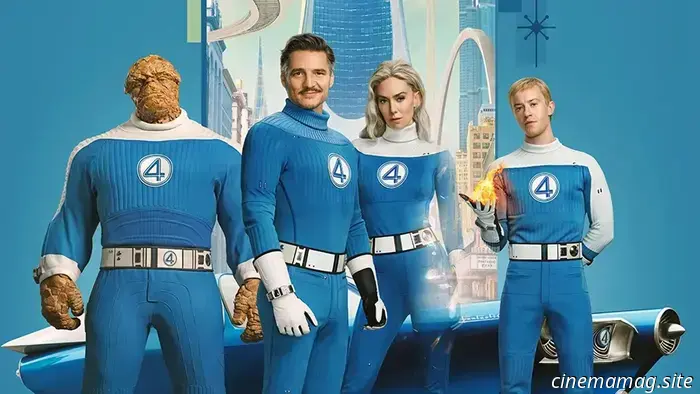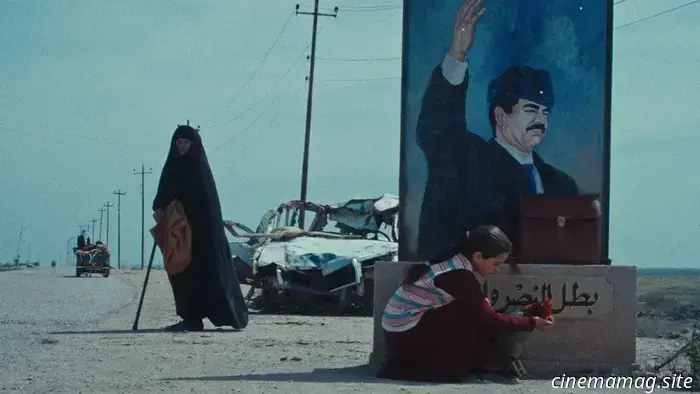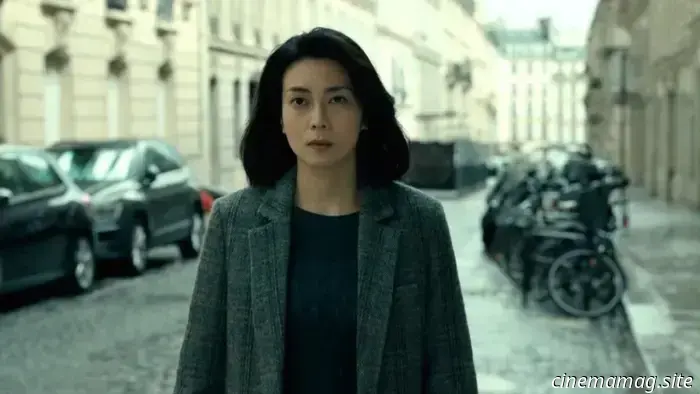
The Life of Chuck Review: A Naive Perspective on a Shared Human Experience
Note: This review was originally part of our coverage of the 2024 TIFF. The Life of Chuck will be released in theaters on June 6.
In just over ten years, Mike Flanagan has transformed from a promising indie director into one of the top American genre filmmakers of today. He began with films like Absentia and Oculus, eventually moving on to studio productions like Doctor Sleep, and has spent recent years working on Netflix’s The Haunting of Hill House and The Fall of the House of Usher. With The Life of Chuck, his first film in five years, Flanagan steps away from horror to create a detailed drama focused on life and mortality. It's only a slight departure from his usual genre, as he adapts a non-horror novella by Stephen King, an author he greatly admires, for better or worse.
The film is presented in reverse order, starting with “Act Three,” which centers on schoolteacher Marty (Chiwetel Ejiofor) and his ex-wife Felicia (Karen Gillan), a nurse at the local hospital struggling under pressure. The film opens during what essentially are the last days of humanity, with a series of natural disasters suggesting the apocalypse is upon them, prompting Marty and Felicia to come together for survival rather than face the end alone. However, amidst the chaos, there’s an intriguing mystery surrounding advertisements celebrating the retirement of accountant Chuck Krantz (Tom Hiddleston). Initially, it’s just a massive billboard, followed by radio and television spots dominating all channels. Who exactly is Chuck Krantz, and does he have a connection to the world’s destruction?
The answers emerge in the second and first acts, which go back in time to explore Chuck's life as both an adult and a child. The complex nature of Chuck’s connection to the disasters in the final act complicates the narrative, yet it ultimately conveys a significant message about making the most of our time on Earth, highlighting that our limited lives are squandered only when we obsess over the certainty of death. Flanagan presents this straightforward message with earnestness, though it doesn’t fully resonate. The intricate plot and structure serve to embellish a central theme that could easily fit within a generic, inspirational social media post. One might describe The Life of Chuck as sweet, but there’s a distinct difference between standard sweetness and overly processed high-fructose corn syrup.
It becomes especially difficult to digest Flanagan’s syrupy elements when contrasted with his skills as a director and editor. Consider the second act of Life of Chuck, where the narrator (Nick Offerman) introduces a scene involving three characters: Chuck, a street drummer (Taylor Gordon), and a young woman (Annalise Basso) who is reeling from a recent breakup. Chuck begins to dance along to the drummer's music, leading to an expansive dance sequence that attracts an audience, culminating in the young woman joining him. Flanagan expertly directs the dance – his precise composition and editing, along with his agile camera movements, create a flowing scene. It’s unfortunate to see such directorial talent applied to a sequence crafted more like a Super Bowl advertisement.
Given its overly sentimental nature, The Life of Chuck may end up being immune to criticism – viewers who take issue with its fundamental themes risk being perceived as dismissing a wholesome message intended to spread happiness. However, good intentions do not exempt these themes from scrutiny when they stand on a shaky foundation. Numerous films have explored the same fundamental aspects of human existence concerning our fears of tragedy, mourning, and death. The best examples, such as those by Terence Davies, confront life's ups and downs directly, as we must accept them regardless. Movies like David Lynch’s The Straight Story depict characters shaped by tragedy and hardship yet choosing kindness and selflessness, illustrating acts of resilience that are profoundly moving and life-affirming.
The Life of Chuck approaches death and opts to delve into the past, misjudging a shift in perspective toward how we perceive life. (In case the narrative or the narrower aspect ratio used for earlier sequences doesn’t clarify this, a character explicitly states the reason for the reverse chronology.) All the technical skill from Flanagan and his solid ensemble can only do so much in the service of such superficial, unsatisfying escapism. This represents a simplistic understanding of a universal experience, and everyone involved in the production, as well as the audience, deserves more.
The Life of Chuck made its premiere at the 2024 Toronto International Film Festival.
Other articles
 The Fantastic Four: First Steps releases a new trailer and posters as ticket sales commence.
Tickets are now available for The Fantastic Four: First Steps, and a new trailer has been released online for Marvel Studios’ film that kicks off Phase Six. This trailer offers another glimpse of Marvel’s First Family as they gear up to confront the formidable, insatiable space deity Galactus and his herald, Silver Surfer. Take a look below […]
The Fantastic Four: First Steps releases a new trailer and posters as ticket sales commence.
Tickets are now available for The Fantastic Four: First Steps, and a new trailer has been released online for Marvel Studios’ film that kicks off Phase Six. This trailer offers another glimpse of Marvel’s First Family as they gear up to confront the formidable, insatiable space deity Galactus and his herald, Silver Surfer. Take a look below […]
 The 1.28 update has been released for DayZ on both PC and consoles.
Bohemia Interactive has launched Update 1.28 for DayZ on Xbox, PlayStation, and PC. This new update brings a variety of features influenced by community feedback from the experimental phase, such as dynamic world events, an expanded arsenal, and additional enhancements. The latest update includes numerous adjustments, additions, and modifications to DayZ. Players might observe improved weapon […]
The 1.28 update has been released for DayZ on both PC and consoles.
Bohemia Interactive has launched Update 1.28 for DayZ on Xbox, PlayStation, and PC. This new update brings a variety of features influenced by community feedback from the experimental phase, such as dynamic world events, an expanded arsenal, and additional enhancements. The latest update includes numerous adjustments, additions, and modifications to DayZ. Players might observe improved weapon […]
 Cannes Review: The President's Cake Contains All the Elements of a Promising Directorial Debut
One of the most remarkable aspects of The President’s Cake is its vibrant colors. The rich red of a rooster's comb emerges from a young girl's carrying pouch; the white embellishments embellish her uncle's blue car; and then there is the expansive view, where a deep evening sky is interrupted by
Cannes Review: The President's Cake Contains All the Elements of a Promising Directorial Debut
One of the most remarkable aspects of The President’s Cake is its vibrant colors. The rich red of a rooster's comb emerges from a young girl's carrying pouch; the white embellishments embellish her uncle's blue car; and then there is the expansive view, where a deep evening sky is interrupted by
 Paul Laverty discusses his thirty years of collaboration with Ken Loach.
It's a chilly March morning in Luxembourg, and my chat with Paul Laverty has shifted to discussing Cantona. “Do you recall that goal he netted, alongside Brian McClair?” I nod, acknowledging it as a classic. “He executed that beautiful 1-2, glanced up, struck the ball,” Laverty describes, whistling the trajectory, “and then simply stood there with his chest puffed out. He
Paul Laverty discusses his thirty years of collaboration with Ken Loach.
It's a chilly March morning in Luxembourg, and my chat with Paul Laverty has shifted to discussing Cantona. “Do you recall that goal he netted, alongside Brian McClair?” I nod, acknowledging it as a classic. “He executed that beautiful 1-2, glanced up, struck the ball,” Laverty describes, whistling the trajectory, “and then simply stood there with his chest puffed out. He
 The 2025 lineup for Japan Cuts includes Kiyoshi Kurosawa, Teki Cometh, and others.
In the past ten years, Kiyoshi Kurosawa has undoubtedly established himself as Japan's leading filmmaker. This realization struck me while reviewing the lineup for the 2025 edition of Japan Cuts at Japan Society, sponsored by GU, scheduled for July 10–20. This premier North American platform for Japanese cinema features four of his films, including two new ones.
The 2025 lineup for Japan Cuts includes Kiyoshi Kurosawa, Teki Cometh, and others.
In the past ten years, Kiyoshi Kurosawa has undoubtedly established himself as Japan's leading filmmaker. This realization struck me while reviewing the lineup for the 2025 edition of Japan Cuts at Japan Society, sponsored by GU, scheduled for July 10–20. This premier North American platform for Japanese cinema features four of his films, including two new ones.
 The trailer for RoboCop: Rogue City - Unfinished Business unveils new characters and gameplay elements.
Studio Teyon and publisher NACON have unveiled a new trailer for the forthcoming RoboCop: Rogue City – Unfinished Business. This independent adventure continues the story from RoboCop: Rogue City, bringing in new characters and features. Check out the new trailer below… In RoboCop: Rogue City – Unfinished Business, players will reconnect with RoboCop’s devoted partner Officer Anne Lewis, along with their Sergeant […]
The trailer for RoboCop: Rogue City - Unfinished Business unveils new characters and gameplay elements.
Studio Teyon and publisher NACON have unveiled a new trailer for the forthcoming RoboCop: Rogue City – Unfinished Business. This independent adventure continues the story from RoboCop: Rogue City, bringing in new characters and features. Check out the new trailer below… In RoboCop: Rogue City – Unfinished Business, players will reconnect with RoboCop’s devoted partner Officer Anne Lewis, along with their Sergeant […]
The Life of Chuck Review: A Naive Perspective on a Shared Human Experience
Note: This review was initially part of our 2024 TIFF coverage. The Life of Chuck hits theaters on June 6. In a little over ten years, Mike Flanagan has transformed from a promising indie director into one of the top American genre filmmakers of our time. Beginning with Absentia and Oculus, he quickly advanced in his career.
